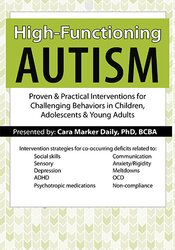

This intensive seminar recording provides proven intervention strategies, essential treatment tools, and behavioural techniques to help you analyze behaviours and actions, identify consequences for behaviours, and teach new skills to children, adolescents and young adults with high-functioning autism (HFA). Walk away with practical intervention techniques for social success, behaviour changes and overcoming challenging co-occurring behaviours that deliver success through adulthood. The challenging co-occurring issues to be addressed are:
Gain valuable insight into common psychotropic medications, including both the helpful effects and potentially problematic side effects, that these individuals are prescribed. We will explore HFA and the new DSM-5® diagnosis of Social-Pragmatic Communication Disorder. You will receive the necessary tools to gain effective collaboration between clinicians, educators and parents. Through case studies, video clips and class participation you will complete the recording with confidence to identify actions that cause impediments in change, utilize more successful consequences for behaviours, and teach new skills to children, adolescents, and young adults with HFA. Don’t just manage these individuals; provide interventions that can lead to successful independence into their adult years!
| File type | File name | Number of pages | |
|---|---|---|---|
| Manual - High-Functioning Autism (2.9 MB) | 54 Pages | Available after Purchase | |
| Instructions for ASHA credit - Self Study (64.4 KB) | Available after Purchase |

Cara Marker Daily, PhD, BCBA, is a licensed psychologist and a Board Certified Behavior Analyst with over 20 years of experience providing assessment and treatment for children, adolescents and young adults with autism in the home, school, hospital and community settings. She works directly with educators, speech/language pathologists, occupational therapists, BCBAs and other professionals. Dr. Daily is the president and training director of Daily Behavioral Health, a leading behavioral health provider in northeast Ohio specializing in assessment, consultation, and treatment of autism, anxiety and disruptive behavior disorders. She is the founder and executive director of the Building Behaviors Autism Center, which has received numerous grants to provide free and reduced cost applied behavioral analysis services to individuals with autism.
Dr. Daily has written several cognitive-behavioral and behavioral-based curriculums focusing on teaching daily living skills to children with autism and published a peer-reviewed journal article supporting evidence for success of these programs. She has presented nationally on topics of autism, disruptive behaviors disorders, anxiety and chronic health conditions in the pediatric population. Dr. Daily has been featured in radio, television, and other media platforms in northeast Ohio. She is the author of The Key to Autism: An Evidence-Based Workbook for Assessing and Treating Children & Adolescents (PESI, 2016).
Dr. Daily received her Ph.D. in School Psychology at the University of South Carolina, and completed an internship in Pediatric Psychology at the Children’s Hospital of Philadelphia and a postdoctoral fellowship in Pediatric Psychology at The Children’s Hospital at The Cleveland Clinic. Dr. Daily is a member of the Department of Pediatrics at Fairview Hospital at the Cleveland Clinic, the American Psychological Association, the Ohio Psychological Association, and the Christian Association of Psychological Studies.
Speaker Disclosures:
Financial: Cara Marker Daily is the president/training director for Daily Behavioral Health, Inc. She is the founder/executive director of the Building Behaviors Autism Center. She is an author for PESI Publishing & Media and receives royalties. Dr. Daily receives a speaking honorarium from PESI, Inc. She has no relevant financial relationships with ineligible organizations.
Non-financial: Cara Marker Daily is a community advisory board member of the Fairview Hospital. She is a board member for Building Behaviors Autism Center. She is a member of the American Psychological Association and the Ohio Psychological Association.
DSM-5® and ICD-10 Updates
Social Skills Interventions
Communication Interventions
Sensory Interventions
Anxiety Interventions
Depression Interventions
ADHD Interventions
Obsessive-Compulsive Disorder (OCD) Interventions
Interventions for Specific Difficult Behaviors
Psychopharmacological Interventions
Case Studies, Demonstrations & Activities
Research, Risks and Limitations
Please wait ...